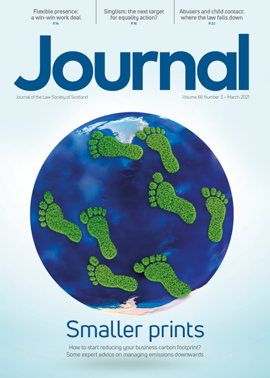In-house: Moving in-house as an NQ

When I decided to move from private practice to an in-house role, I wasn’t sure what to expect. Throughout university the focus had been on securing a traineeship in private practice, and my friends and I had followed the same route, completing traineeships and taking on NQ roles within commercial firms. After a year as an NQ in an IP and commercial team, I decided that despite enjoying my role, I was interested in experiencing working in-house. I have now been working as a solicitor at The Data Lab Innovation Centre for almost two years.
These are the key changes I experienced when moving from private practice to in-house as an NQ solicitor, along with the advice I would give to anyone considering a similar path.
1. Change in support and resources
The obvious change, particularly in a move to a smaller organisation, will be in the legal support and resources available to you. Within The Data Lab (now virtual) office, I am the only member of the legal “team”. As The Data Lab is part of the University of Edinburgh, I am fortunate to have great support from the wider legal services team at the university whenever needed, but day to day I will largely be working alone providing advice across the business’s activities.
Initially, the prospect of not being surrounded by other solicitors to rely on for immediate advice and reassurance was slightly daunting. As a trainee and NQ solicitor in private practice you become accustomed to sitting within a group of more experienced solicitors who you can rely on to quickly check over an email or to ask the numerous questions that pop up throughout the day. This of course provides an invaluable learning experience, but it can make it difficult to assess your own abilities and whether you can stand on your own two feet.
After a couple of months adjusting to working more independently, this has become one of the aspects of my role which I really enjoy. Being trusted to make the right decisions and manage my workload has been a confidence boost and allowed me to overcome the “imposter syndrome” I felt in the initial weeks.
My advice to anyone considering a move to in-house in the early stages of their career would be to find out what support will be available to you when you do need that second opinion. Although there are drawbacks to not working as closely with other legal experts, working on a more independent basis will allow you to develop as a solicitor in different ways and force you to become more proactive in finding new learning opportunities.
2. Approaching risk
As a trainee and NQ solicitor in private practice, the “commercial awareness” which is so often spoken about had seemed a somewhat abstract concept at times. Becoming part of an organisation and essentially having one “client” means this commercial awareness is ingrained in your day-to-day work.
I have found that working in-house has given me a better appreciation of my role to support the business and its goals, in addition to minimising risk. Being part of an organisation has given me clearer insight as to where being overly risk averse or perfectionist is, in some cases, not practical or desirable. Understanding the background to each issue or the relationships with the other parties to a contract has allowed me to judge better where to draw the line and where extended negotiations will only cause deadlines to be missed or key relationships to be strained.
With any move in-house it will take time to adjust to a potentially new approach to risk and to understand fully the organisation’s motivations and where those risks lie. In those early days, getting as much insight as possible into the business and its relationships as well as understanding the background to previous transactions and issues can make this a smoother transition.
3. Culture
Finally, in moving from private practice to in-house, you can of course expect to experience a shift in working culture, both in terms of the working environment and your relationship to your colleagues.
As opposed to in a traditional law firm, where you will be largely working within your practice group, working within an organisation will, in many instances, involve working with and providing advice to colleagues across the whole organisation in all different business functions and levels of seniority. Again, what was an initially daunting prospect has turned out to be another positive aspect of the job. The insight into a variety of projects and roles, along with the opportunity to work with a diverse range of people, keeps the work interesting and means there is always a new question to be dealt with or problem to be solved.
Adapting to any new job will of course depend almost entirely on the culture of the organisation. As the motivation to transition to working in-house will often partly come from a desire to experience a different working culture, it is important to understand whether that new working environment will meet your expectations before making a move. I was lucky that pre-COVID, I could pick up a lot from my interview being held within the office. Experiencing the hub of noise and activity, and the general laid back feel of the office, prepared me for a slight culture shock but one which I was keen to experience. In virtual interview situations it will be more difficult to pick up on the culture of an organisation by any means other than asking questions. Over lockdown, we have had successful interviewees ask to have an informal chat with the team in which they will be working, which has given them a good opportunity to assess the “feel” of the organisation before accepting the role.
Choosing your path
There are obvious advantages to both working in private practice and in-house. Figuring out which route to take can be a difficult one. For me, moving in-house early in my career has felt like the right decision and I am glad not to have let those initial doubts get in my way. If you think a change to in-house is for you, do your research to find a role that is the right fit and allow yourself time to adjust to a new environment and different way of working.
Perspectives
Features
Briefings
- Civil court: Nuts and bolts issues
- Corporate: The limits of reflective loss
- Intellectual property: rights in employee creations
- Agriculture: Allowing tenants to leave for value
- Family: Teaming up to Zoom in on marriage
- Data protection: EU transfers flow for a little longer
- Scottish Solicitors' Discipline Tribunal
- Property: Access by prescription: challenge of proof
- In-house: Moving in-house as an NQ
In practice
- New AML guidance: what you need to know
- Schools outreach: a virtual revolution
- The Word of Gold: The joy of cheques
- Wills and executries: learning the hard way
- OPG update
- The Eternal Optimist: No going back
- Handling police complaints: seeking fitness for purpose
- Profile: Christine O’Neill QC
- Ask Ash: Double demands







